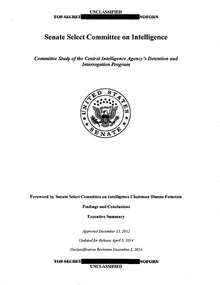United States Senate Select Committee on Intelligence
The United States Senate Select Committee on Intelligence (sometimes referred to as the Intelligence Committee or SSCI) is dedicated to overseeing the United States Intelligence Community—the agencies and bureaus of the federal government of the United States who provide information and analysis for leaders of the executive and legislative branches. The Committee was established in 1976 by the 94th Congress.[1]
| Select committee | |
|---|---|
Active United States Senate 116th Congress | |
 | |
| History | |
| Formed | May 19, 1976 |
| Succeeded | Church Committee |
| Leadership | |
| Chair | Richard Burr (Chairman) (R) Since January 3, 2015 |
| Ranking member | Mark Warner (Vice Chairman) (D) Since January 3, 2017 |
| Structure | |
| Seats | 15 members |
| Political parties | Majority (8)
|
| Jurisdiction | |
| Purpose | to "oversee and make continuing studies of the intelligence activities and programs of the United States Government" |
| Oversight authority | United States Intelligence Community |
| House counterpart | House Permanent Select Committee on Intelligence |
| Meeting place | |
| 211 Hart Senate Office Building Washington, D.C. | |
| Website | |
| intelligence | |
| Rules | |

The Committee is "select" in that membership is temporary and rotated among members of the chamber.[2] The committee comprises 15 members. Eight of those seats are reserved for one majority and one minority member of each of the following committees: Appropriations, Armed Services, Foreign Relations, and Judiciary.[3] Of the remaining seven, four are members of the majority, and three are members of the minority.[3] In addition, the Majority Leader and Minority Leader are non-voting ex officio members of the committee.[3] Also, the Chairman and Ranking Member of the Committee on Armed Services (if not already a member of the select Committee) are ex officio members.[4]
As part of its oversight responsibilities, the Committee performs an annual review of the intelligence budget submitted by the president and prepares legislation authorizing appropriations for the various civilian and military agencies and departments comprising the intelligence community. These entities include the Office of the Director of National Intelligence, Central Intelligence Agency, Defense Intelligence Agency, National Security Agency, National Geospatial-Intelligence Agency, National Reconnaissance Office, as well as the intelligence-related components of Department of State, Federal Bureau of Investigation, Department of the Treasury, and Department of Energy.
The Committee makes recommendations to the Senate Armed Services Committee on authorizations for the intelligence-related components of the U.S. Army, U.S. Navy, U.S. Air Force, and U.S. Marine Corps. The Committee also conducts periodic investigations, audits, and inspections of intelligence activities and programs.
History
The Select Committee on Intelligence was preceded by the Church Committee (1975). Senator Daniel K. Inouye (D-Hawaii) became the first chairman of the committee when it was established until 1979.[5]
Former Director of Central Intelligence George Tenet was staff director of the committee when David Boren of Oklahoma was its chairman. The committee was the center of much controversy and contention during the run-up to the war in Iraq in 2002 and 2003, when chairmanship of the committee changed hands following the November 2002 election. Among the committee staff members at that time were: Pete Dorn, Professional Staff Member; Jim Hensler, Deputy Staff Director; Vicki Divoll, General Counsel; Steven Cash, Professional Staff Member & Counsel; and Alfred Cumming, Minority Staff Director.
On July 9, 2004, the committee issued the Report of the Select Committee on Intelligence on the U.S. Intelligence Community's Prewar Intelligence Assessments on Iraq, and on June 5, 2008, it issued a long-delayed portion of its "phase two" investigative report, which compared the prewar public statements made by top Bush administration officials to justify the invasion with the intelligence information that was available to them at that time.[6]
In a March 6, 2008, letter to the Senate leadership, 14 of the 15 then members of the Committee proposed the creation of a new Senate Appropriations Subcommittee on Intelligence to prepare the annual intelligence budget.[7] The proposed Subcommittee, on which members of the Intelligence Committee would be heavily represented, would increase the Committee's influence and leverage over executive branch intelligence agencies, and require continuing disclosure of the annual budget for the National Intelligence Program. The proposal has been opposed by the leadership of the Senate Appropriations Committee, however.[8]
In 2013, and beyond, the SSCI received renewed attention in the wake of Edward Snowden's disclosures regarding the NSA surveillance of communications. Senator Dianne Feinstein and the SSCI made several statements on the matter, one of which was notably disputed: that the NSA tracked US citizens locations via cellphone. Later, the SSCI Staff Director, David Grannis, claimed that the NSA did not collect cellphone location, claiming the Senator was "speaking extemporaneously".[9] The SSCI later came to prominence in relation to voting to publish in March 2014[10] and then publishing in December 2014 of a report on the policies of the CIA on torture.
In 2017, the SSCI began investigating Russian interference in the 2016 United States elections, possible incriminating links between members of the Russian government and Donald Trump's presidential campaign, and the security of election processes in the United States.[11] On April 21, 2020, the SSCI (chaired at the time by the Republican Richard Burr) released a widely-redacted report[12][13][14] with its final judgment that the intelligence community's assessment was "coherent and well-constructed"; the SSCI therefore supports the intelligence community's claim that Putin's "interference in the 2016 U.S. presidential election" in favor of candidate Trump was unprecedented in its "manner and aggressiveness."[15][16]
Members, 116th Congress
| Majority | Minority |
|---|---|
|
|
| Ex officio | |
|
|
Source: Member list[18]
Members, 115th Congress
| Majority | Minority |
|---|---|
|
|
| Ex officio | |
|
|
Source: Member List[20]
Chairs
| Nº | Chair | Party | State | Term | ||
|---|---|---|---|---|---|---|
| 1 |  |
Daniel Inouye | Democratic | Hawaii | 1976–1979 | |
| 2 |  |
Birch Bayh | Democratic | Indiana | 1979–1981 | |
| 3 |  |
Barry Goldwater | Republican | Arizona | 1981–1985 | |
| 4 |  |
David Durenberger | Republican | Minnesota | 1985–1987 | |
| 5 |  |
David Boren | Democratic | Oklahoma | 1987–1993 | |
| 6 |  |
Dennis DeConcini | Democratic | Arizona | 1993–1995 | |
| 7 | .jpg) |
Arlen Specter | Republican | Pennsylvania | 1995–1997 | |
| 8 | Richard Shelby | Republican | Alabama | 1997–2001 | ||
| 9 |  |
Bob Graham | Democratic | Florida | 2001 | |
| 10 | Richard Shelby | Republican | Alabama | 2001 | ||
| 11 |  |
Bob Graham | Democratic | Florida | 2001–2003 | |
| 12 |  |
Pat Roberts | Republican | Kansas | 2003–2007 | |
| 13 |  |
Jay Rockefeller | Democratic | West Virginia | 2007–2009 | |
| 14 |  |
Dianne Feinstein | Democratic | California | 2009–2015 | |
| 15 | .jpg) |
Richard Burr | Republican | North Carolina | 2015–present | |
Staff directors
- Christopher Joyner, 2015–present
- David Grannis, 2009–2014
- Andy Johnson, 2004–2008
- Alfred Cumming, 2000–2003
- George Tenet, 1989–1993
See also
- Senate Intelligence Committee report on CIA torture
- James R. Clapper § Testimony to Congress on NSA surveillance programs, 2013
- List of current United States Senate committees
- United States House Permanent Select Committee on Intelligence
- United States Senate Committee on Armed Services
References
- Snider, L. Britt (2008). The Agency & The Hill: CIA's Relationship with Congress, 1946-2004, Chapter 2 (PDF). CIA Center for the Study of Intelligence. Retrieved June 19, 2008.
- Kaiser, Frederick (September 16, 2008). "Congressional Oversight of Intelligence: Current Structure and Alternatives". Congressional Research Service. Retrieved April 23, 2009.
- "Committee on Intelligence" from Riddick's Senate Procedure
- "Rules of Procedure" (PDF). U.S. Senate Select Committee on Intelligence. Retrieved March 30, 2017.
- "INOUYE, Daniel Ken - Biographical Information". United States Congress. Retrieved February 19, 2016.
- Mazzetti, Mark; Shane, Scott (June 6, 2008). "Bush Overstated Iraq Evidence, Senators Report". The New York Times. p. A1. Retrieved June 17, 2008.
- Senate Select Committee on Intelligence (March 6, 2008). "Letter to Senators Harry Reid and Mitch McConnell" (PDF). Retrieved April 14, 2008.
- Senate Appropriations Committee (April 5, 2008). "Letter to Senators Harry Reid and Mitch McConnell" (PDF). Retrieved April 14, 2008.
- Ali Watkins. "Senate intelligence committee director denies NSA collects data on Americans' cellphone locations". McClatchy Washington Bureau.
- "Statement on SSCI Vote for Declassification of Torture Report". OpenTheGovernment.org.
- Tau, Byron (February 8, 2018). "Senate Intelligence Committee Writing Report on Election Vulnerabilities Ahead of Midterms". WSJ. Retrieved March 15, 2018.
- 116th Congress, 1st Session. "Russian Active Measures Campaigns and Interference in the 2016 U.S. Election. Vol. 4: Review of the Intelligence Community Assessment with Additional Views" (PDF). www.intelligence.senate.gov. Retrieved April 21, 2020.
- Dilanian, Ken (April 21, 2020). "Bipartisan Senate report says 2017 intel assessment about Russian interference and Trump was accurate". NBC News. Retrieved April 22, 2020.
- Johnson, Kevin; Phillips, Kristine (April 21, 2020). "Senate committee backs intelligence agencies' findings that Russia meddled in 2016 election". USA Today. Retrieved April 22, 2020.
- Johnson, Kevin; Phillips, Kristine (April 21, 2020). "Senate committee backs intelligence agencies' findings that Russia meddled in 2016 election". USA Today. Retrieved April 22, 2020.
- Knutson, Jacob (April 21, 2020). "Senate Intel affirms that Russia interfered to help Trump in 2016". Axios. Retrieved April 22, 2020.
- Angus King is an independent, but caucuses with the Democrats.
- "Committee Members". U.S. Senate Select Committee on Intelligence. Retrieved August 29, 2019.
- Angus King is an independent, but caucuses with the Democrats.
- "115th Congress (2017-2018) | Intelligence Committee". www.intelligence.senate.gov. Retrieved January 5, 2017.